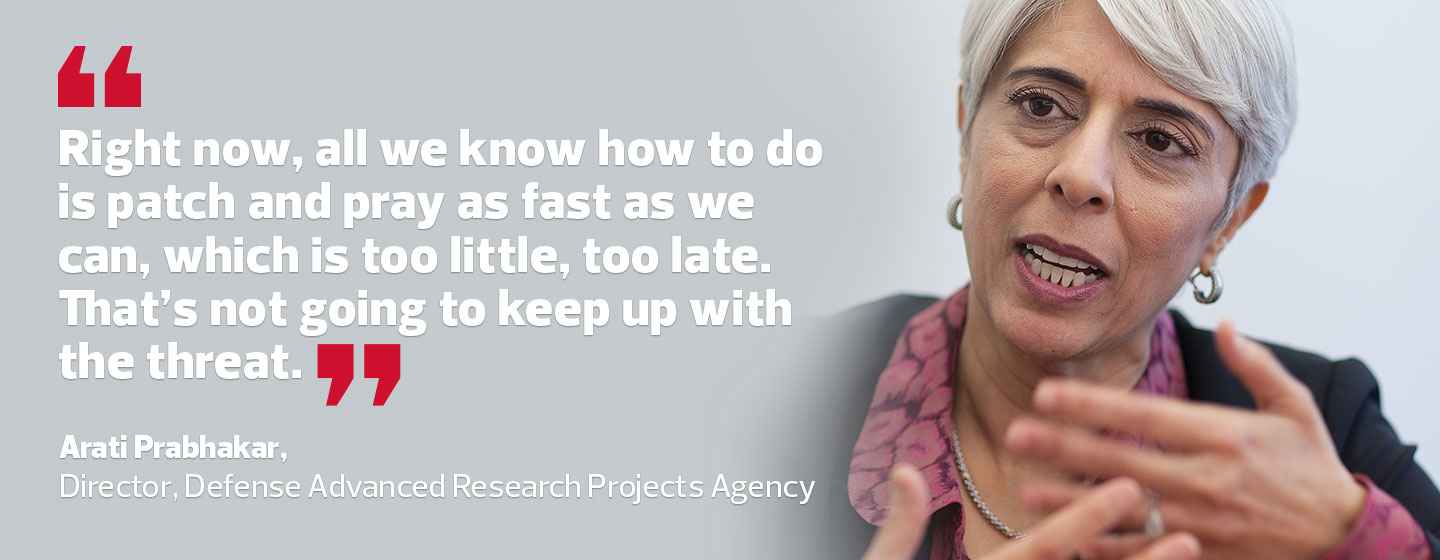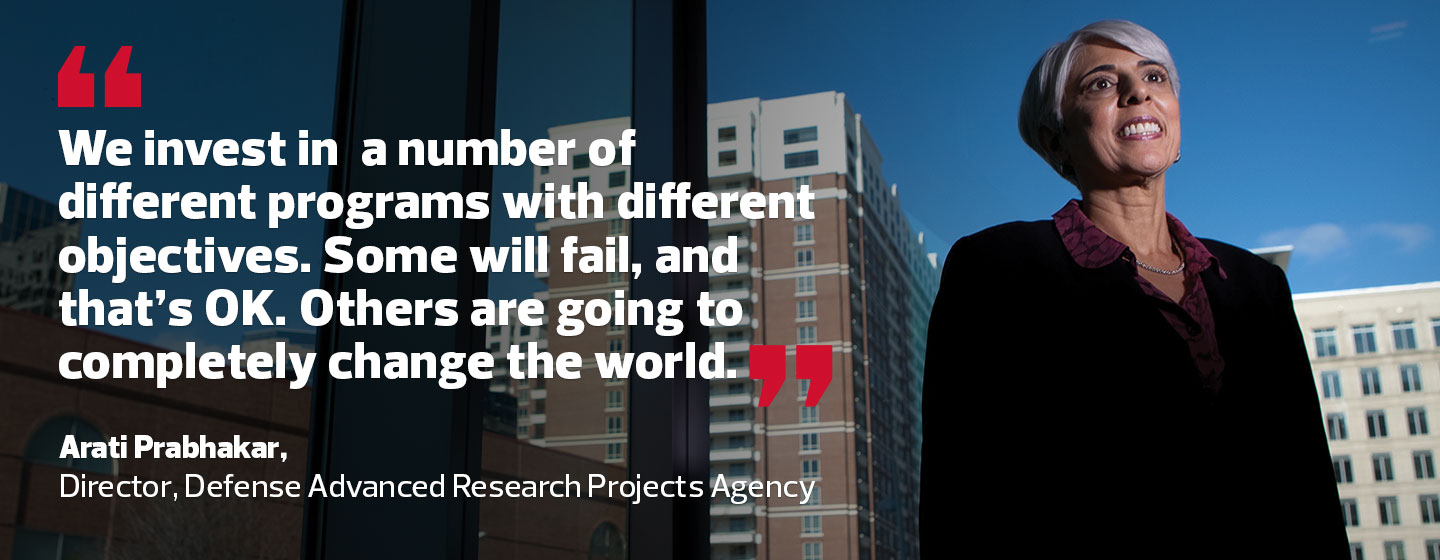DARPA Director: Today's Risky Bets Will Be Tomorrow's Technology Breakthroughs
Outside of government, if you asked someone to name one thing about the Defense Advanced Research Projects Agency, it’s likely they’ll say it’s the birthplace of the Internet (sorry, Al Gore). But that’s one in a long list of world-changing innovations created at the agency.
Arati Prabhakar is on her second tour at DARPA. She returned to the agency in 2012 to become its director, nearly 20 years after first working there as a program manager. In the interim, she led the National Institute of Standards and Technology and spent a decade as a venture capitalist in Silicon Valley.
Prabhakar spoke with FedTech Managing Editor David Stegon about DARPA’s long track record of success, innovation and what makes her run to get to work every morning.
FEDTECH: What inspires you about leading an agency like DARPA?
PRABHAKAR: DARPA is a small part of the nation’s R&D ecosystem, but it has this amazing, very specific mission: to develop breakthrough technologies for national security. So the place is filled with this wonderful mix of extreme science and engineering — and a deep commitment to public service. What’s more inspiring than that?
FEDTECH: You have an unusually broad perspective on DARPA, having worked as a program manager in the 1990s, then working in Silicon Valley, and now serving as the agency’s director. Did DARPA seem different when you took over in 2012?
PRABHAKAR: I was gone for 19 years, and my biggest question when I returned was, how had it changed? DARPA was this place I had treasured earlier in my career.
The first thing I noticed was that everything appeared to have changed. The program managers were different; the technology was different. But after 24 hours, I could tell the culture was exactly the same: Employees were crazy with excitement, working with their hair on fire. I knew I was home.
FEDTECH: The type of work DARPA does probably attracts that type of person.
PRABHAKAR: It does, and that doesn’t happen by accident. We nurture that all the time. Everything DARPA does should change, except the culture.
FEDTECH: What’s your favorite current project?
PRABHAKAR: There are so many cool things, but here’s one that I find fascinating: We all use cameras and electronic imagers to look at objects, but the information we receive is generally limited to the intensity and wavelength of the incoming light.
Photons carry much more information than that, though. They are changed by every interaction they have on their way to that sensor.
So what if we could put all that information together — information about where those photons had been and what they had experienced?
We’re working on that, and we think it will allow us to create rich 3D images from single sources of light and maybe even see behind obstacles or around corners. That, to me, is a great example of going way beyond something that’s possible today.
FEDTECH: What’s intriguing about DARPA is the agency’s range. There are so many different disciplines.
PRABHAKAR: That diversity is important. If you’re going to take risks, you have to diversify, as you don’t know what’s going to be a big success. We don’t want to put $3 billion in one basket, so we invest in a number of different programs with different objectives. Some will fail, and that’s OK. Others are going to completely change the world.
FEDTECH: How does DARPA differ in process from the innovators in Silicon Valley?
PRABHAKAR: Fundamentally, the mission is different. Ours is breakthrough technologies. For Silicon Valley and other parts of the tech economy, it is new companies and industries. What we share is a worldview that sees technology as a powerful, disruptive force.
DARPA’s work spans prototypes of new military systems to early funding of the pivotal new core technologies that future systems will need. In the latter area, we often work with those in the commercial tech community — today, in areas ranging from artificial intelligence to computer security and biotech and anything else you can think of.
FEDTECH: DARPA has made great strides in cybersecurity. How are you trying to change that space?
PRABHAKAR: We will always have some degree of vulnerability in our information systems. What we’re trying to do with our research investments is change the fundamentals and take entire classes of problems off the table by building security techniques that can scale as fast as the digital information world is growing.
Right now, all we know how to do is patch and pray as fast as we can, which is too little, too late. That’s not going to keep up with the threat.
FEDTECH: What are some of the solutions the agency is currently working on?
PRABHAKAR: One I’m excited about is our Cyber Grand Challenge, which will have its final event in August in conjunction with DEFCON, the big hackers’ conference in Las Vegas. Each year at DEFCON, teams compete against one another to find vulnerabilities in each other’s networks and protect their own. We’re building a league of machines to play the same game.
It turns out the machines aren’t very good yet, but as we have seen with chess, they’re going to get better really fast. And when you have the ability to do cybersecurity for your network at machine speed, that’s much better than training more and more people to patch as fast as they can.

FEDTECH: What’s the biggest challenge for your agency?
PRABHAKAR: We are fortunate that our bosses, from the secretary of defense to the president, understand and support our mission, as does Congress. They give us room to take risks, which is both unusual and very valuable. We have every opportunity to deliver.
The big challenge for me and my deputy is to shape the agency’s portfolio so that we have the best set of possible bets on things that can really be game-changing.
FEDTECH: Is there pressure to continuously innovate?
PRABHAKAR: We put that pressure on ourselves all the time. Part of the art of managing research — and this is true beyond DARPA — is you don’t get real-time feedback.
Sometimes you get results in months or years, sometimes it’s decades, so the decisions you make as you try to innovate are with incomplete information.
We watch how the world changes and how technology progresses. Program managers decide day to day whether to support a project that is struggling but looks promising, or whether those resources should go somewhere else. The question becomes, when do you double down on certain, very challenging efforts, and when do you fold?
FEDTECH: How does DARPA keep pace given how fast technology changes?
PRABHAKAR: Half of our 200-person staff is made up of technical program managers. They typically come in for three- to five-year tours, and for many of them, this will be their only time in government. They come here with a sense of urgency because everyone knows they have the freedom to think big here, but only for a fixed amount of time — and they want to get a lot done.
That structure keeps us fresh and keeps us from getting bogged down in certain areas. It also means we can be pretty nimble. When we see a big new opportunity, we are one hire away from diving into that area.
FEDTECH: What’s on the horizon?
PRABHAKAR: The future is always undefined and changing, and the opportunities will continue to shift and, at times, surprise us. But by having this strong foundational culture that is always forward-looking, always looking for what’s possible and willing to take risks, DARPA has every chance of maintaining and extending its nearly 60-year record of outsized innovation.
Every year, you should see something new and unexpected in our portfolio. And in 10 to 20 years, much of what we’ll be working on would likely be completely unrecognizable to us today. The world will be different, but our mission and our enthusiasm will remain. I hope that never changes.










